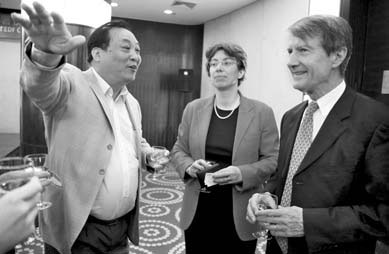French power group switches onto wage deal
Updated: 2012-10-26 08:05
By Du Juan and Chen Xin (China Daily)
|
|||||||||||
|
Marianne Laigneau, senior executive vice-president of Electricite de France; Herve Machenaud (left), another senior executive vice-president of the company; and Zhou Guoping, labor union chairman of the company's China branch, celebrate at a ceremony on Thursday in Beijing. Du Lianyi / China Daily |
Breakthrough contract helps both employers and workers, union says
Union campaigns for collective wage bargaining in Fortune 500 companies paid dividends on Thursday with Europe's largest power company in China signing up.
Electricite de France Group agreed on a collective contract with the company's trade union in China which represents 92 percent of employees. It was the first time the group had signed such a contract outside France.
Negotiations went on for 18 months and the contract introduces a transparent salary system, incorporating the local consumer price index. Housing benefits and longer paid annual leave up to 27 days are also guaranteed.
The company also proposes establishing a supplemental pension for employees on top of the State pension.
"EDF does not only invest in power projects in China, we also invest in every individual working for the group," said Marianne Laigneau, senior executive vice-president of the company.
"It was a long negotiation process with challenges because of the different policies and situations in China, but it is also very creative."
The Foreign Enterprise Trade Union Association has about 70 company members. EDF was the first to sign the collective contract.
"The signing of collective contracts in China tells us that an international company's success in a foreign country is not only depending on capital and technology investment but also sharing the same values," Laigneau said.
The key is an effective dialogue system, said Zhou Guoping, chairman of EDF's China trade union. He said many contributed to the result.
The company provides a number of promotion opportunities, Laigneau said, and the new chief executive officer of EDF China, who was promoted this year, is the first Chinese CEO in the group.
Some other Fortune 500 companies in China, such as Bosch and Mitsubishi, have also held collective bargaining.
China's Trade Union Law stipulates that the primary task of a union is to boost collective contract agreements and to mediate labor relations through negotiation between employees and employers.
About 80 percent of the 4,100 enterprises set up by Fortune 500 companies in China had introduced collective bargaining by the end of 2011, according to the All-China Federation of Trade Unions.
The federation plans to introduce collective talks in 95 percent of Fortune 500 companies in China by the end of 2013.
Promoting collective contracts will boost government plans to reform income distribution.
The reform, aiming especially at narrowing the urban-rural income gap, will establish a regular pay increase mechanism, enhance public services and supervise the salaries of senior executives.
Si Jian, a division chief overseeing collective contracts with the Beijing Municipal Federation of Trade Unions, said that Fortune 500 companies were a priority for collective bargaining.
Many of the companies that have not signed up to it are showing an interest, he said.
"No Carrefour outlets in the capital have introduced collective talks but the company's representative in China told me that they are quite willing to work with us to hold collective bargaining in all 17 outlets in the city as soon as possible," Si said.
Although Carrefour has established its trade union, the union has yet to fully play its role with elected representatives of workers holding talks with the employer, Si said.
To address similar problems, Si said his organization plans to train union officials in Fortune 500 companies to help conduct collective bargaining.
A lack of understanding of the role of a union and collective talks has hampered the enthusiasm of some Fortune 500 companies to conduct collective talks, according to Si.
"Those companies should realize that collective talks are beneficial to both employees and the employers," he said.
According to Duan Yang, vice-chairwoman of Shenyang's federation of trade unions, all the 49 Fortune 500 companies that have invested in Shenyang, capital of Liaoning province, have introduced collective bargaining, benefiting more than 13,000 workers.
In Shanxi province, 20 Fortune 500 companies have set up operations and have all introduced collective negotiations, said local unionists.
Contact the writes dujuan@chinadaily.com.cn and chenxin1@chinadaily.com.cn
(China Daily 10/26/2012 page1)
Today's Top News
President Xi confident in recovery from quake
H7N9 update: 104 cases, 21 deaths
Telecom workers restore links
Coal mine blast kills 18 in Jilin
Intl scholarship puts China on the map
More bird flu patients discharged
Gold loses sheen, but still a safe bet
US 'turns blind eye to human rights'
Hot Topics
Lunar probe , China growth forecasts, Emission rules get tougher, China seen through 'colored lens', International board,
Editor's Picks

|

|

|

|

|

|






